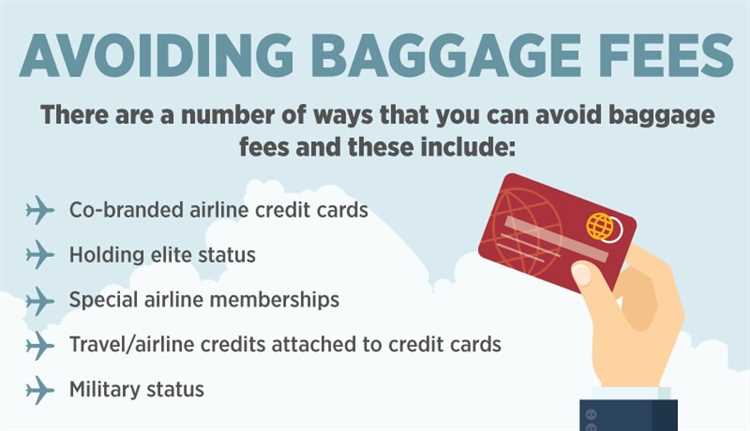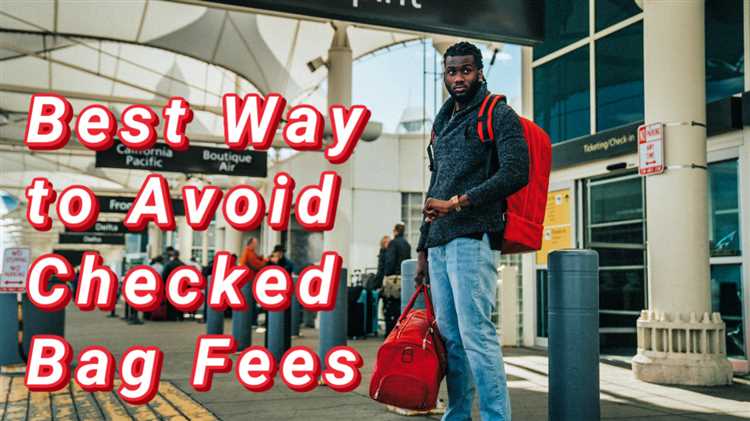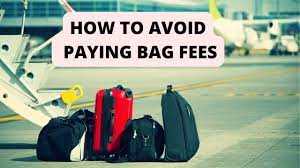
When planning a trip, one of the costs that can quickly add up is baggage fees. Airlines charge hefty fees for checked bags and even carry-on bags on some flights. However, with a little bit of planning and strategy, you can avoid these fees and save money on your air travel.
1. Pack Light: One of the simplest ways to avoid bag fees is to pack light. Be mindful of what you really need for your trip and try to eliminate any unnecessary items. Consider wearing your bulkiest clothing items and shoes on the plane to save space in your luggage.
2. Use a Personal Item: Most airlines allow you to bring a personal item, such as a backpack or laptop bag, in addition to your carry-on bag. Take advantage of this by packing as much as you can in your personal item. This way, you can avoid having to pay for an additional carry-on bag.
3. Check the Airline’s Baggage Policy: Each airline has its own baggage policy, so it’s important to check the specific rules and restrictions before you book your flight. Some airlines may allow a certain number of bags for free, while others may charge for all bags. Knowing the airline’s policy in advance can help you plan accordingly.
4. Join a Frequent Flyer Program: Many airlines offer frequent flyer programs that allow you to earn points or miles for each flight. These programs often come with perks, such as waived baggage fees for certain levels of membership. By joining a frequent flyer program, you can potentially save money on bag fees and enjoy other benefits.
5. Share Luggage: If you’re traveling with a companion or family member, consider sharing a suitcase. This can help you save money on bag fees by pooling your luggage together and checking only one bag instead of two. Just make sure to distribute the weight evenly to avoid any additional charges for overweight bags.
6. Fly with an Airline that Doesn’t Charge Bag Fees: Some airlines, particularly low-cost carriers, do not charge bag fees. If you’re looking to save money on bag fees, consider flying with one of these airlines. Keep in mind that these airlines may have other restrictions or fees, so it’s important to research and compare all costs before making your decision.
By following these tips, you can avoid paying unnecessary bag fees and save money on your air travel. Remember to always check the airline’s baggage policy and plan your packing accordingly to make the most of your luggage allowance. Happy travels!
- Pack Light and Compact
- Wear Your Bulkiest Items
- Use a Personal Item as a Carry-On
- Take Advantage of Airlines’ Elite Status or Credit Card Benefits
- How to Qualify for Elite Status
- Choosing the Right Credit Card
- Ship Your Luggage Ahead of Time
- 1. Save on Baggage Fees
- 2. Streamline Your Travel Experience
- Know the Airline’s Baggage Policy and Fees
- Q&A,
- Can I avoid paying for checked baggage?
- What are the size and weight restrictions for carry-on bags?
- What are some ways to pack efficiently and fit more in my carry-on bag?
- Are there any items that are not allowed in carry-on bags?
- Can I transfer my checked baggage from one airline to another without incurring additional fees?
- Is there a way to avoid paying bag fees when traveling by air?
Pack Light and Compact
One of the simplest ways to avoid bag fees is to pack light and compact. Airlines often charge fees for checked baggage or for oversized or overweight bags, so it’s important to pack strategically to minimize the number and size of your bags.
Start by choosing a smaller suitcase or backpack that meets the airline’s carry-on size restrictions. This will allow you to bring your bag on board for free and avoid any additional fees. Be sure to check the airline’s website for specific size and weight restrictions.
When it comes to packing, be mindful of the essentials and leave behind any non-essential or bulky items. Consider packing versatile clothing that can be mixed and matched to create different outfits, reducing the need for multiple items. Roll your clothes instead of folding them to save space and prevent wrinkles.
Another way to save space is to use packing cubes or compression bags. These can help compress your clothing and maximize the space in your bag. Utilizing the empty spaces within your shoes by stuffing them with socks or small items can also save space.
If you’re traveling with liquids, make sure to follow the TSA’s guidelines for carry-on liquids. Use travel-sized containers and pack them in a clear, quart-sized plastic bag to ensure easy inspection at security checkpoints.
Consider your destination and the amenities provided. For example, if staying at a hotel that offers toiletries, you may be able to leave behind shampoo, conditioner, and other bulky items. Researching the local weather and packing accordingly can also help you avoid bringing unnecessary items.
Remember, packing light not only saves you money on bag fees but also makes traveling more convenient and hassle-free. By being mindful of what you pack and making strategic choices, you can enjoy a stress-free journey while saving money on air travel.
Wear Your Bulkiest Items
One way to avoid paying for extra baggage is to wear your bulkiest items instead of packing them. This strategy can help you save money and space in your suitcase.
For example, if you’re traveling to a colder destination, consider wearing your heavy coat, boots, and sweater on the plane instead of packing them. Not only will this save you from having to pay for overweight or extra bags, but it will also keep you warm during the flight.
Similarly, if you have a bulky item like a winter jacket or a thick sweater that takes up a lot of space in your suitcase, wear it on the plane and use it as a makeshift pillow or blanket during the flight.
Remember to dress in layers so you can easily adjust your clothing to the temperature on the plane and at your destination. This way, you can stay comfortable during the flight without having to pack unnecessary items in your luggage.
Conclusion
By wearing your bulkiest items instead of packing them, you can save on baggage fees and free up space in your suitcase for other essential items. This simple trick can make a big difference when it comes to saving money on air travel.
Use a Personal Item as a Carry-On
One way to save money on bag fees when flying is to use a personal item as your carry-on. Most airlines allow passengers to bring a carry-on bag and a personal item on board for free, so take advantage of this policy.
A personal item can be a smaller bag or backpack that fits under the seat in front of you. This can be used to store essential items such as your laptop, tablet, or any other electronic devices you may need during the flight.
By utilizing your personal item as a carry-on, you can avoid having to pay for an additional bag or checking in a larger suitcase. This not only saves you money but also allows you to have all your important belongings with you at all times.
When choosing a personal item, make sure it meets the airline’s size restrictions. Most airlines have specific dimensions for personal items, so check the airline’s website or contact them directly to know the exact size limitations.
Remember to pack efficiently and pack only what you truly need for the duration of your flight. By keeping your personal item light and compact, you can maximize your carry-on allowance and avoid any extra fees.
Using a personal item as a carry-on is a smart and cost-effective way to save money on bag fees while ensuring that you have all your essential items close at hand during your flight.
Take Advantage of Airlines’ Elite Status or Credit Card Benefits

If you are a frequent flyer or have a credit card that offers travel perks, you may be eligible for benefits that can help you save money on bag fees. Many airlines have elite status programs that offer perks such as free checked bags, priority boarding, and extra baggage allowances. By reaching elite status with an airline, you can enjoy these benefits and avoid paying for checked bags.
Another way to save on bag fees is to take advantage of credit card benefits. Some credit cards offer travel rewards and perks that can help offset the cost of bag fees. For example, certain credit cards offer statement credits for travel expenses, including bag fees. By using one of these credit cards to pay for your flights, you can save money on bag fees and potentially earn additional rewards.
How to Qualify for Elite Status
To qualify for elite status with an airline, you typically need to meet certain criteria, such as flying a certain number of miles or segments in a calendar year. Airlines usually have different tiers of elite status, with each tier offering different benefits. The higher the tier, the more perks you can enjoy. To achieve elite status, you may need to fly a certain number of miles or segments, or spend a certain amount of money on flights. Some airlines also offer status challenges or matches, where you can earn elite status faster by completing certain requirements.
Choosing the Right Credit Card

When it comes to credit card benefits, it’s important to choose the right card that aligns with your travel habits and preferences. Look for a credit card that offers travel perks such as statement credits for bag fees, airline lounge access, and priority boarding. Additionally, consider the annual fee and interest rates associated with the card. Make sure the benefits outweigh the cost of the card to ensure you’re getting the most value.
| Airline | Elite Status Tiers | Benefits |
|---|---|---|
| Airline 1 | Gold, Platinum, Diamond | Free checked bags, priority boarding, extra baggage allowance |
| Airline 2 | Silver, Gold, Platinum | Free checked bags, priority boarding, lounge access |
| Airline 3 | Silver, Gold, Platinum, Executive | Free checked bags, priority boarding, upgraded seats |
By taking advantage of airlines’ elite status programs or utilizing credit card benefits, you can avoid paying excessive bag fees and save money on air travel. Take the time to understand the requirements for elite status and choose a credit card that offers the right perks for your travel needs. With a little planning and strategy, you can enjoy the benefits of elite status or credit card perks and keep more money in your pocket.
Ship Your Luggage Ahead of Time
If you want to save money on air travel and avoid the hassle of dealing with luggage fees, consider shipping your luggage ahead of time. There are several benefits to this approach:
1. Save on Baggage Fees

By shipping your luggage instead of checking it in, you can avoid the hefty baggage fees airlines often charge. Shipping your luggage ahead of time can be more cost-effective, especially if you’re traveling with heavy or oversized items.
2. Streamline Your Travel Experience
Shipping your luggage ahead can help streamline your travel experience. Instead of waiting in long check-in lines or dealing with the stress of hauling your bags through the airport, you can simply ship them to your destination and have them waiting for you when you arrive.
However, before shipping your luggage, there are a few things to consider:
Proper Packaging:
Make sure to pack your items securely to prevent any damage during shipping. Use sturdy boxes or suitcases and consider using padding or bubble wrap for fragile items.
Delivery Timing:
Consider the time it will take for your luggage to arrive at your destination. Make sure to ship it with ample time to spare, accounting for any potential delays.
Insurance Coverage:
Check whether your chosen shipping method offers insurance coverage for lost or damaged luggage. It’s always better to be safe than sorry, so consider purchasing additional insurance for valuable or irreplaceable items.
By shipping your luggage ahead of time, you can save money on baggage fees and enjoy a more convenient travel experience. Just remember to plan ahead and take the necessary precautions to ensure your luggage arrives safely at your destination.
Know the Airline’s Baggage Policy and Fees
One of the most important steps to avoid bag fees is to familiarize yourself with the baggage policy of the airline you are flying with. Each airline has its own rules and regulations regarding baggage size, weight, and fees. By knowing these policies in advance, you can ensure that you pack accordingly and avoid any surprise charges at the airport.
Start by visiting the airline’s website or contacting their customer service to get the most up-to-date information on baggage allowances and fees. Pay close attention to the weight and size restrictions for both carry-on and checked bags. Most airlines have specific dimensions for carry-on bags and charge extra fees for oversized or overweight luggage.
In addition to weight and size restrictions, some airlines also have restrictions on the number of bags you can bring for free. They may allow one free carry-on and one free checked bag, or they may charge fees for both. It’s important to know these policies in advance so that you can plan accordingly and avoid paying unnecessary fees.
It’s also worth noting that some airlines offer baggage fee waivers or discounts for frequent flyers, members of certain loyalty programs, or holders of specific credit cards. These benefits can help you save money on bag fees, so be sure to check if you qualify for any of these perks.
By taking the time to research and understand the airline’s baggage policies and fees, you can avoid surprises at the airport and save money on bag fees. Remember to double-check the policies before your trip, as they may change or vary depending on the destination or type of fare you have booked. Being prepared and knowledgeable can go a long way in helping you keep your travel costs down.
Q&A,
Can I avoid paying for checked baggage?
Yes, there are several ways to avoid paying for checked baggage. One option is to only bring a carry-on bag that fits within the airline’s size and weight restrictions. Another option is to fly with an airline that offers free checked baggage, typically on international flights or as part of a specific fare class. Additionally, some credit cards offer travel perks that include waived checked baggage fees.
What are the size and weight restrictions for carry-on bags?
The size and weight restrictions for carry-on bags vary by airline. Most airlines allow a maximum size of around 22x14x9 inches and a maximum weight of around 40 pounds. However, it is important to check with your specific airline to ensure you meet their requirements.
What are some ways to pack efficiently and fit more in my carry-on bag?
There are several ways to pack efficiently and fit more in your carry-on bag. One strategy is to roll your clothes instead of folding them, as this can save space. You can also use packing cubes or compression bags to condense your clothing. Additionally, wearing your bulkiest items, such as your coat or boots, on the plane can help save space in your bag.
Are there any items that are not allowed in carry-on bags?
Yes, there are several items that are not allowed in carry-on bags due to security reasons. These items include sharp objects like knives and scissors, firearms and ammunition, flammable liquids and explosives. It’s important to review the Transportation Security Administration (TSA) guidelines to ensure you do not pack any prohibited items in your carry-on bag.
Can I transfer my checked baggage from one airline to another without incurring additional fees?
Transferring checked baggage from one airline to another can sometimes incur additional fees, especially if the airlines have different baggage policies. However, some airlines have interline agreements that allow for seamless baggage transfers without additional fees. It’s important to check with your airlines before your flight to understand their specific baggage transfer policies and any associated fees.
Is there a way to avoid paying bag fees when traveling by air?
Yes, there are several ways you can avoid bag fees when traveling by air. By following these tips, you can save money on your next trip.